Key points
The main key points in a maid of honor speech is:
- Start with a warm welcome. Greet the guests and thank them for coming. Tell them who you are and how you know the bride. Keep it short and sweet.
- Share memories and stories that show your bond. Pick tales that make people smile. Skip embarrassing stories about wild nights out or old flames.
- End with heartfelt wishes for the couple. Wrap it up by looking to their future together. Finish by asking everyone to raise their glasses to toast the newlyweds.
Contents
Preparing to Write the Speech

You don’t know where to start? Take a deep breath. It’s not as hard as it seems.
Give yourself some time. Start early instead of rushing a day before the wedding day. You need time to think, write, and practice. Get a notebook or open a document on your phone to draft what you want to share.
Then start by writing down any memories and feelings for the bride. No need for perfect words yet— get ideas down.
Think about who will hear your speech. Will there be kids? Grandparents? This helps you pick the right stories and jokes.
Finding Your Voice
Your speech should sound like you. Don’t try to copy someone else’s style. If you’re not funny then don’t force jokes. If you’re not poetic then keep it simple.
A wedding planner once said: “The best speeches are ones that come from a place with honesty rather than impressing one. Just be real. Be you.”
Gathering Inspiration and Ideas
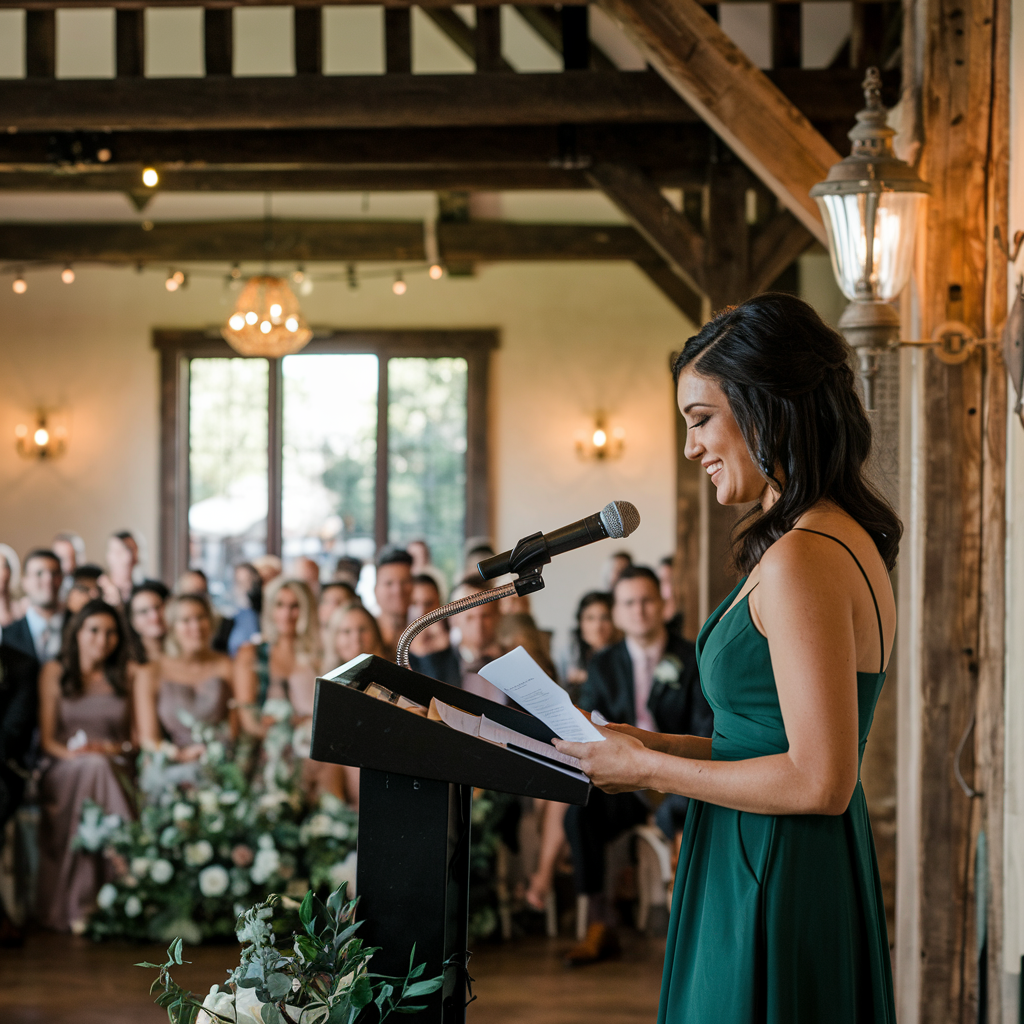
Now for the fun part—gathering stories!
Think about your first meeting with the bride or the first time she talked about her partner. Did she call you right after their first date? Write that down. Think of times that show what makes her special. Maybe she helped you through a tough time or maybe you have a funny story that shows her personality.
But be careful with funny stories—don’t make her blush. Talk to family and friends for ideas too. Her mom might have great childhood stories. Maybe her college roommate remembers how she met her partner. These talks will give you more material than you need.
What to Include
Speech should have a few key parts. Here’s what you can follow in crafting your speech.
- Start with who you are and how you know the bride.
- Add 2-3 stories that show your bond.
- Talk about her partner and why they’re good together.
- End with good wishes for their future.
- Keep it short—aim for 3-5 minutes.
Researching Speech Structure and Style
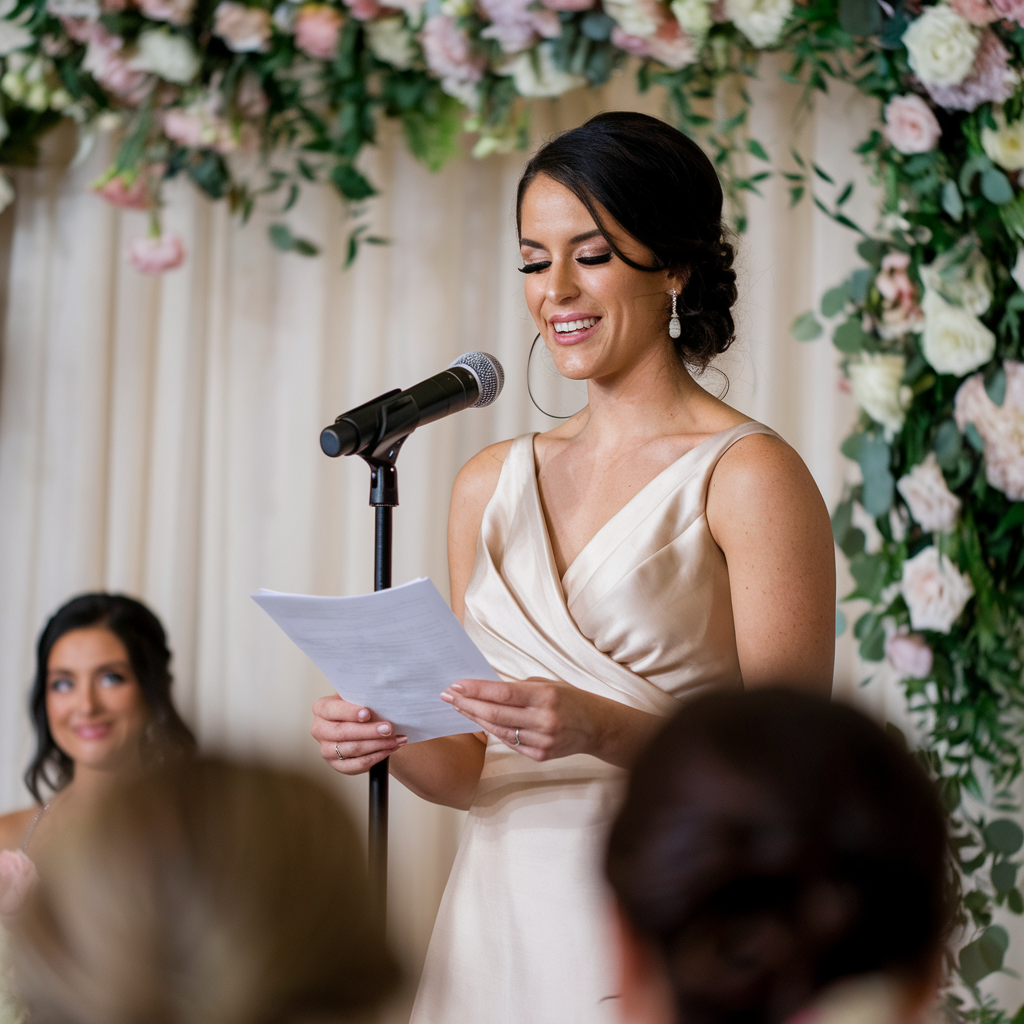
Outlining can help even if you’re not the best writer. Most good speeches have a pattern: an opening message, your stories, the couple’s story, and then toast the couple. The beginning and end hold everything together.
The Knot recommends starting with something warm that will draw people into your wedding Opening with “Webster’s Dictionary says a love is…” is very typical and already done. Try something more personal like “The first time Sarah told me about James, she couldn’t stop smiling.”
Simplicity does the trick. Short sentences work better than long ones. Clear beats are clever. Speak in ways that feel natural to you. Practice out loud not just in your head. Record yourself on your phone. This allows you to hear how it flows and what are the possible tripping points.
Common Mistakes to Avoid
There are some big no-nos for wedding speeches. Some of them are:
- Avoid speaking about anything related to past relationships.
- Skip inside jokes that only two people will get.
- Avoid mentioning anything that might beleaguers the bride, groom, or guests.
- Watch your drinking before the speech.
- Take five deep breaths if you feel nervous. It worked better.
Crafting the Speech

Constructing a fantastic maid of honor speech is a lot easier than you think. Don’t beat around the bush; say want your heart tells you.
Opening with a Strong Introduction
Start by saying who you are. It might seem obvious but not everyone who comes to the wedding knows you. It works well to keep it simple and say “Hi all. I’m [your name]. I’ve known [bride’s name] for [number] years”
Then hook your audience with your story with the bride. You can start with a funny little story or a nice quote about love or friendship.
Keep it short and sweet. Your intro should only take about 30 seconds. People are eager to hear your stories instead of having a long build-up.
Sharing Personal Stories and Anecdotes
This is where your speech gets real. You could pick 1-2 stories of the bride that show what she is like and why you love her. You can discuss how you met, the time she helped you out through a rough patch or even just a funny memory you have.
Wedding speech coach Kate Thompson said: “The best anecdotes are those that make the bride look good, reveal her character, and identify with the audience.”
Expressing Genuine Emotion and Sentiment
Don’t be afraid to get a bit emotional. It’s okay to show how much you care. If you tear up – that’s okay still. These moments make the speech more heartfelt and memorable.
Share what makes the bride special to you. Then talk about the couple. Share how you met the groom or how happy they are together.
End with warm wishes for their future. Maybe simply say “I’m happy you found each other and can’t wait to see the happiness you bring to each other’s lives.”
Structuring the Speech
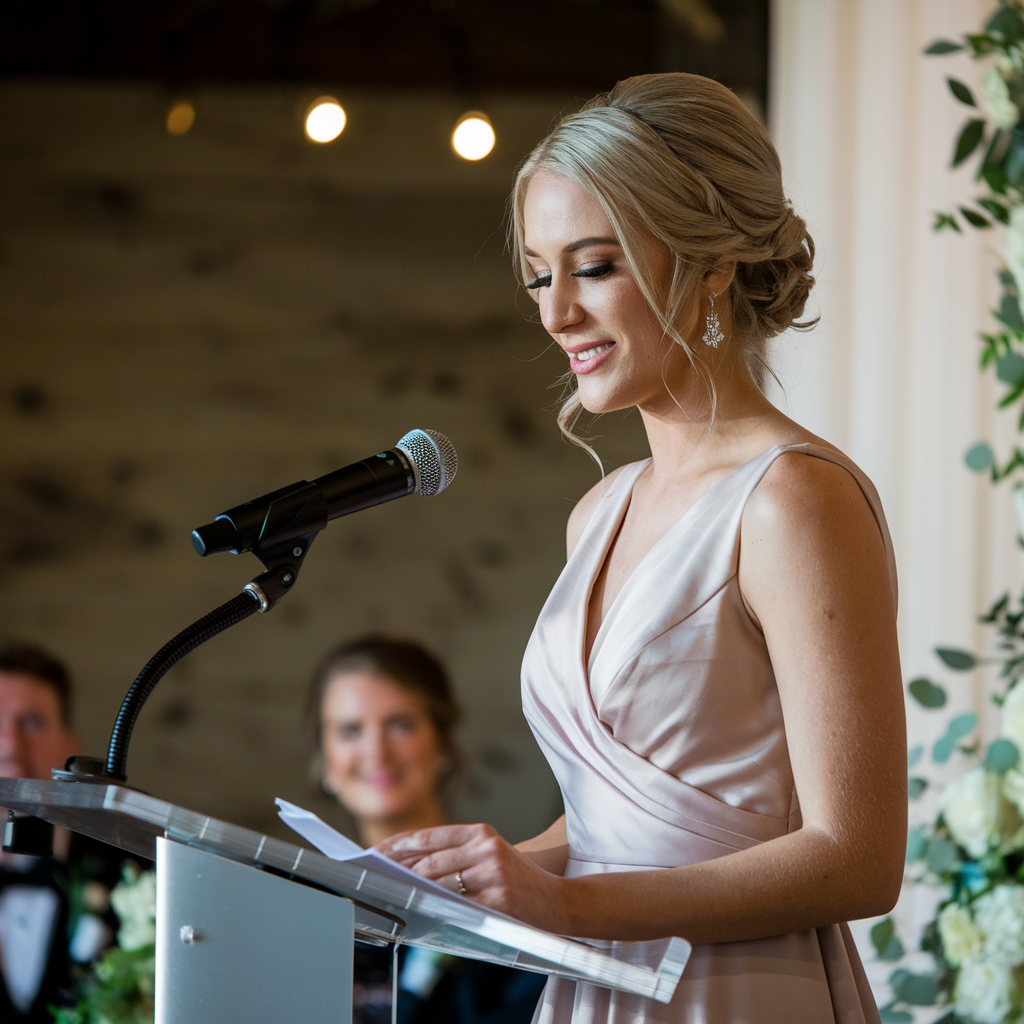
A good speech has three main components: a beginning that grabs attention, a middle that tells stories, and an end that wraps up with good wishes.
Studies showed that speeches that have this simple pattern are easier for guests to follow.
Start with who you are and your link to the bride. Then share 2-3 stories about the bride or the couple. End with a toast. Keep it short—about 3-5 minutes tops.
Creating a Logical Flow
Your speech needs to make sense from one point to the next.
Start by talking about how you met the bride and move to the present to talk about where their love is. Then you should finish off with your hopes for their future.
Using time as your guide makes your speech easy to follow. Another way to do this is grouping your thoughts by theme like her best traits, your friendship, or their relationship growth.
Write down key points on note cards. Number them. This helps you stay on track if you get nervous.
Balancing Humor and Sentimentality
Finding the right mix of funny and sweet is tough – but it’s the key.
You can use the sandwich approach: begin with something funny, followed by something sweet, and conclude with something warm.
Be careful with jokes. The jokes funny to you or the bride may not be funny to others. Let someone who isn’t in on the joke preview your humor.
And skip embarrassing stories. The bride should feel honored not humiliated. When in doubt you lean toward sweet rather than funny.
Revising and Refining
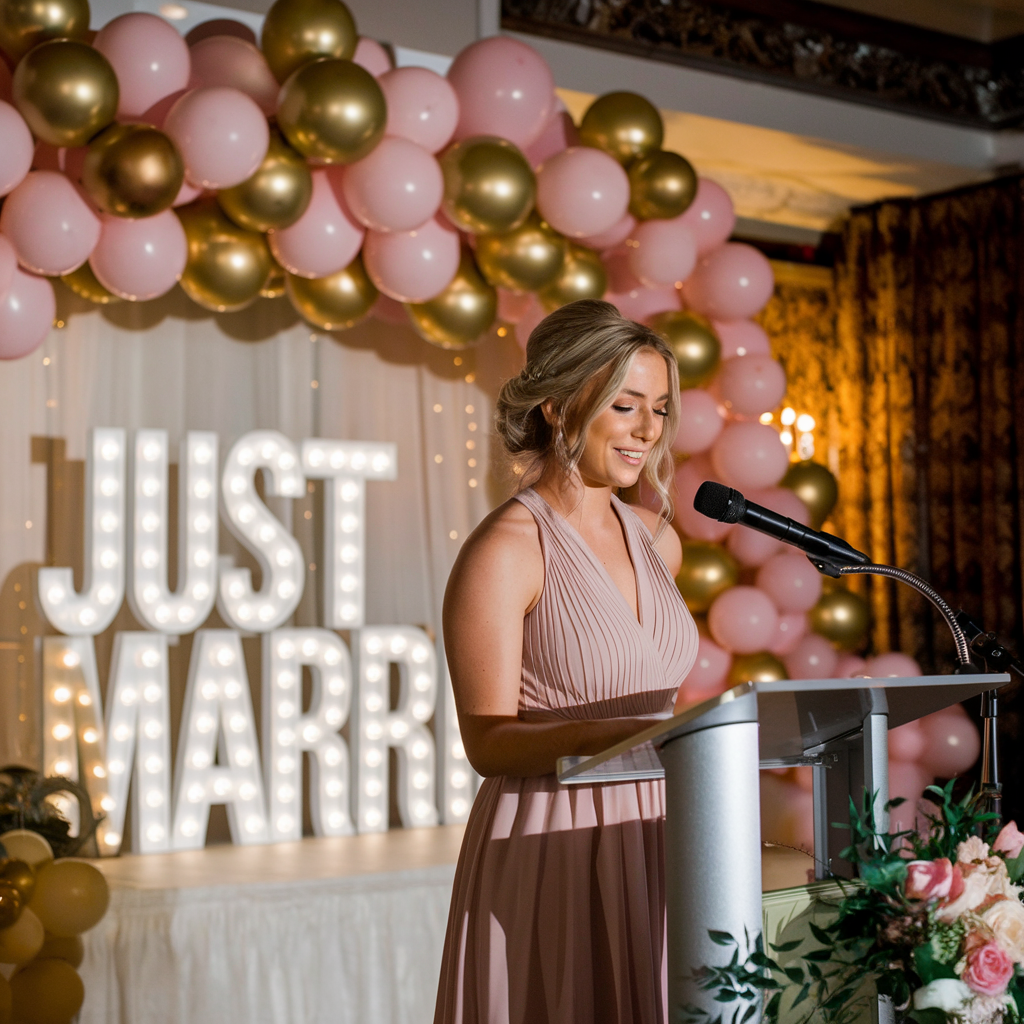
Revising and refining are important in the process of writing.
It’s about revising and refining the text for better clarity and coherence. Write it countless times until your speech makes sense or when the sequence and content sound right.
Editing for Clarity and Brevity
Remember that the guests come from different parts of the bride’s life. Some jokes may not land if half the room is unfamiliar with the story.
Here are some tips on how the story can be shared:
- Cut any part that drags on too long.
- Take out inside jokes only a few people will get.
- Trim stories to their key points.
- Read it out loud to catch awkward phrases.
- Stick to one main idea per paragraph.
Incorporating Feedback from Others
Having someone else listen to your speech helps you uncover blind spots. Here’s some tips on who you can ask to:
- Someone who knows the bride well
- Someone who will give honest feedback
- Someone who isn’t afraid to tell me to cut something
- Someone who can keep the secret well-kept
The final call stays yours. Know that not all feedback should reflect or be considered.
Delivering the Speech
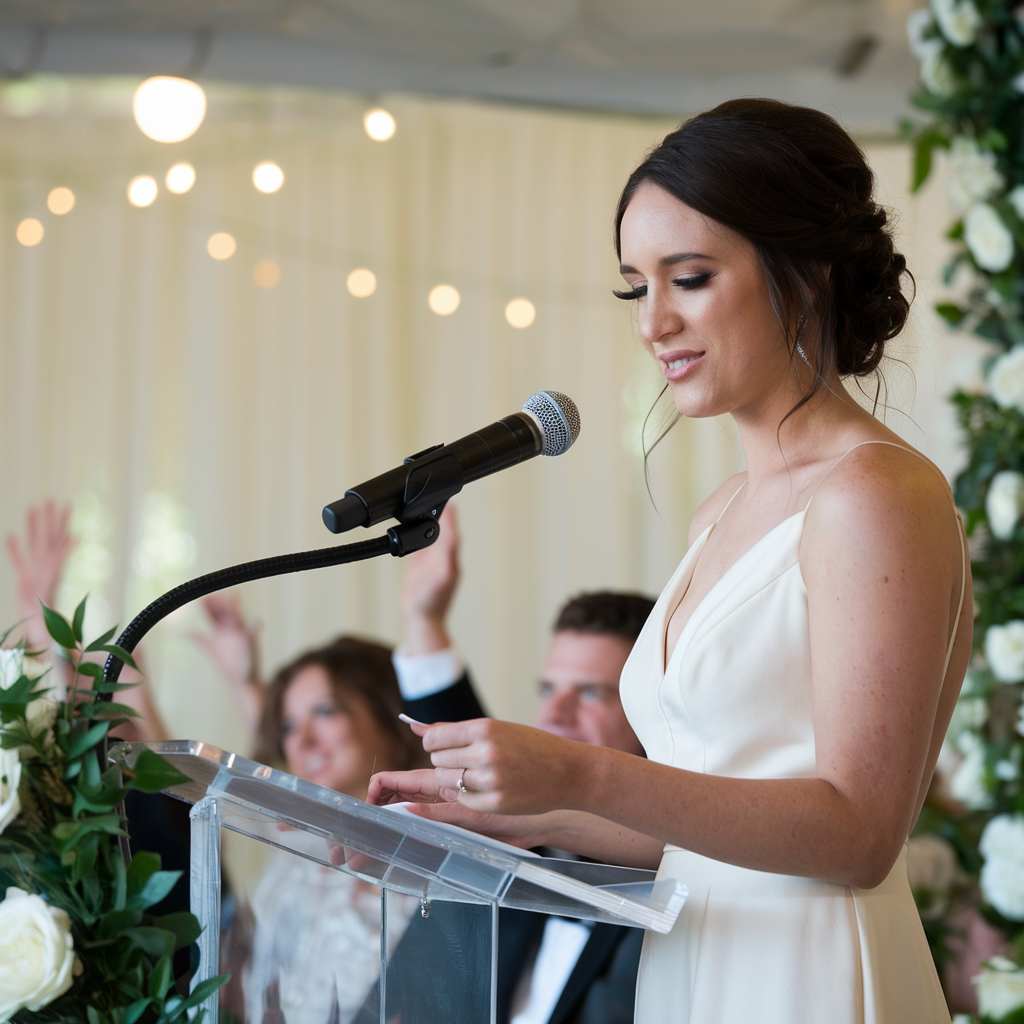
Be genuine in sharing your feelings – that’s the key to delivering a maid of honor speech.
Practicing Delivery and Timing.
- Practice makes perfect. Practice your speech as if you were talking to someone and make it feel natural as if you’re simply telling a story.
- Time your talk. Keep it short—about 2-3 minutes Guests get restless during long speeches.
- Record yourself on your phone. It helps you identify sections where you speak too fast or too quietly.
- Practice in front of friends. They can give you tips on what works and what doesn’t.
- Make sure you familiarize yourself with your speech so that you do not have to read it out word for word.
- Looking up and making eye contact makes a big difference.
- Bring note cards with key points. They’re your safety net if nerves make you forget.
Managing Public Speaking Anxiety.
Feeling scared is normal even with professionals. Here are some ways to make you feel better:
- Take deep breaths before you start to calm your body.
- Remember that guests want you to do well. They’re on your side.
- Focus on the bride – not the crowd.
- Avoid too much alcohol before speaking. Too much makes it hard to speak clearly.
- Stand tall and smile. Your body language shapes how you feel.
- Try using the 5-4-3-2-1 method. Announce 5 things you see, 4 things you can touch, 3 things you can hear, 2 things you can smell, and finally, 1 thing you can taste.
Frequently Asked Questions (FAQ)
How do you calm pre-speech stomach nerves?
Control your stomach nerves by practicing my honor speech until it feels natural. Professional speechwriter Heidi Ellert-McDermott from Speechy advises deep breathing. Remember that everyone in the crowd wants you to succeed as the maid shares this special moment.
When should I write my MOH speech?
Start writing your speech at least two weeks before the wedding to avoid last-minute pressure. This gives you time to gather input from family members and polish your words about the couple. Professional speechwriters suggest you need this time to capture the best memories and create a piece that honors your sister’s special day.
Should I memorize or read my speech?
Having a paper copy or phone notes gives you something to hold when speaking in front of everyone. Either way works; just remember that authenticity matters more than perfect words.
How do I address both bride and groom?
Start by using their names—”Name and Spouse’s Name, your love story has inspired everyone here today.” Balance your stories about your sister with genuine compliments about her partner. End by acknowledging how they complement each other—bringing out the best in each other.
What's the ideal length for a maid of honor speech?
The ideal honor speech should only take 3-5 minutes. Wedding speeches that run long lose the crowd’s attention. Keep it short but meaningful and focus on quality over quantity.
How personal should maid of honor speeches get?
Share personal stories that highlight your sister’s character without embarrassing her—avoid jokes about exes or wild times that might make the bride cringe. Find the sweet spot between intimate enough to show your deep relationship but appropriate for families including parents and the groom’s relatives. Remember that the best honor speeches make the newlyweds feel loved.
What if I'm both a bridesmaid and sister of the bride?
Have a unique perspective to share about the bride’s journey from sibling to spouse. Weave together childhood memories with observations about how her relationship with her partner has changed her life for the better. Focus on how she’s grown while still being the same person who shared so many important moments with you before her fiancé entered the picture.
How do I include a toast in my honor speech?
End your speech by asking everyone to raise their glasses to toast the couple’s future happiness. A simple toast formula: “Please join me in raising your glass to my sister and her amazing partner—may your love story continue to shine brighter than your wedding accessories.” The toast marks the perfect transition from your speech to the celebration to bringing everyone together in one beautiful moment.
How do I prepare for unexpected emotions?
Practice your speech enough times so that you can navigate through emotional points without breaking down completely. Keep tissues nearby in case your heart gets the better of you—there’s no shame in showing how much your sister’s wedding moves you. Remember to pause and breathe if emotions rise—sometimes the best advice is to take a moment and let things absorb.
What's one thing most maids of honor forget?
Another often overlooked tip is checking if the mic works before you start speaking—no one wants to repeat the beginning of a carefully crafted speech. Some also forget to dress comfortably enough to deliver your toast without worrying about shoes, dress size, or makeup—your words matter more than your appearance.

I am an award-winning author who has deep insights into the world of dating & relationships. I have won several awards including Andromeda Magazine – Fantasy Short Fiction Story award amongst several other awards and writing achievements.